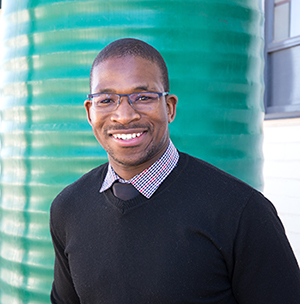Latest News Archive
Please select Category, Year, and then Month to display items
06 April 2018
Photo Rulanzen Martin
 From the left: Dr Thulisile Mphambukeli, leader of the BRICS research team that is exploring the political economy of water and food security, and her research partner, Dr Victor Okorie.
From the left: Dr Thulisile Mphambukeli, leader of the BRICS research team that is exploring the political economy of water and food security, and her research partner, Dr Victor Okorie.
A Brazil, Russia, India, China and South Africa (BRICS) delegation is to hold the 10th Annual BRICS Summit in the last week of May 2018 in Johannesburg. Dr Thulisile Mphambukeli, leader of the University of the Free State (UFS) research team alongside Dr Victor Okorie from the Department of Urban and Regional Planning, in collaboration with Prof Lere Amusan of North-West University, will ensure that water and food security is a prominent feature on the gathering’s agenda.
First, the project titled: “Exploring the political economy of water and food security nexus in BRICS and Africa” will debut at the National Institute for the Humanities and Social Sciences BRICS Think Tank Forum”.
According to Dr Mphambukeli, the key to water security is attitudinal change by means of education and conscientisation. This, she is adamant about, holds the potential to drive behavioural adjustments in the way society interacts with water.
Genetic and social approaches
Dr Okorie asserts that if strides towards reducing the demand for water were to be made, research efforts should be geared towards effecting changes at DNA level. Meaning we need to explore waterwise ways that enable crops and animals to thrive optimally.
The project also looks at social dimensions of water such as flushing a toilet. “Research activities on redesigning toilets, especially the urinal, where more than nine litres of water are used to flush less than one cubic centimetre of urine, are timely in the context of managing water and the food nexus crises,” said Dr Okorie.
Combining the genetic and social approaches would allow us to produce more with a smaller water footprint. This can be made possible by implementing precision agriculture which is about estimating and applying exact quantities of water and nutrients needed for the production of crops or the raising of livestock.
Paradigm shifting policies
Prof Amusan said the team intended to propose functional solutions that take the quality of water into consideration. Equitable production and distribution of water depends on endorsing policies of co-production between citizens, governments and the public sector. BRICS member states mutually consider water and food security as an issue of paramount significance, hence its feature on this prestigious summit’s agenda.
University of the Free State strives towards going ‘green’
2017-08-07

Benedict Mochesela from University Estates on the
UFS Bloemfontein Campus. A total of thirty brand-new
water storage tanks, between 5 000 and 20 000 litres,
were installed.
Photo: Anja Aucamp
Eight provinces, including the Free State, were declared disaster areas last year due to the ongoing drought. This had a devastating effect on the agricultural sector, leaving many communities dry.
University Estates at the University of the Free State found an ideal project to make university buildings greener. A total of thirty water storage tanks, varying in size from 5 000 to 20 000 litres, were installed at various buildings on the Bloemfontein Campus. As a pilot phase, these tanks were specifically installed at residences and buildings with high traffic volumes.
Importance of water tanks at the UFS
According to Benedict Mochesela, Project Manager of this initiative, the purpose of the project is to harvest rainwater, which will be used during emergencies when the campus does not have water and the emergency water storage facility is depleted. “This water is not intended for drinking, but for the flushing of toilets,” says Mochesela.
He mentioned that the water will also be used for watering flowerbeds and gardens when the water has been standing for a long time without being used.
Recycling water: An initiative to protect the environment
A number of water storage tanks are already in place at the Qwaqwa Campus and a preliminary phase of using grey water from residences is currently ongoing at the South Campus. Grey water is made up of bath, shower, and bathroom sink water. The water is reused for toilet flushing as well as for irrigation purposes.
“Recycling of water is one of a number of initiatives the university intends to undertake to ensure and show the community that this institution remains conscious of the environment and to changes which we continuously need to adapt to.”